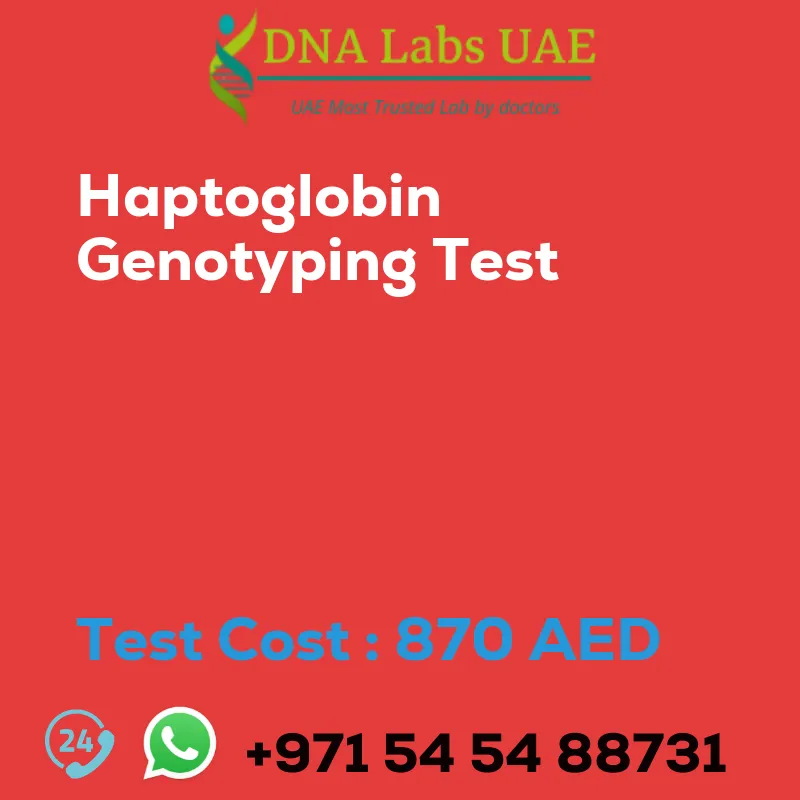Haptoglobin Genotyping Test
Test Cost: AED 870.0
At DNA Labs UAE, we offer the Haptoglobin Genotyping Test to determine an individual’s haptoglobin genotype. Haptoglobin is a protein produced by the liver and released into the bloodstream. It binds to free hemoglobin, preventing its potential toxic effects.
Test Components and Price
The Haptoglobin Genotyping Test is priced at AED 870.0. The test requires a sample of 4 mL (2 mL min.) of whole blood collected in 1 Lavender top (EDTA) tube. The sample should be shipped refrigerated and should not be frozen.
Report Delivery
Sample collection for the test is done on Tuesdays and Saturdays by 11 am. The test report will be delivered within 8 days.
Test Method and Type
The Haptoglobin Genotyping Test is performed using the Polymerase Chain Reaction (PCR) method. It falls under the category of Genetic Disorders tests.
Test Department and Doctor
The test is conducted in the Molecular Diagnostics department and is supervised by a qualified Physician.
Pre Test Information
No special preparation is required before taking the Haptoglobin Genotyping Test.
Test Details
The Haptoglobin Genotyping Test analyzes an individual’s DNA to identify the presence of two alleles, Hp1 and Hp2, which determine the haptoglobin genotype. The test can be performed using various techniques, such as PCR or DNA sequencing.
The haptoglobin genotype can have implications for various health conditions. For example, individuals with the Hp2-2 genotype have an increased risk of cardiovascular disease, diabetes, and certain types of cancer. On the other hand, individuals with the Hp1-1 genotype may have a better response to certain treatments or medications.
Overall, haptoglobin genotyping provides valuable information about an individual’s genetic predisposition to certain health conditions and may help guide personalized medical interventions.
| Test Name | HAPTOGLOBIN GENOTYPING Test |
|---|---|
| Components | |
| Price | 870.0 AED |
| Sample Condition | 4 mL (2 mL min.) whole blood in 1 Lavender top (EDTA) tube. Ship refrigerated. DO NOT FREEZE. |
| Report Delivery | Sample Tue / Sat by 11 am; Report 8 days |
| Method | PCR |
| Test type | Genetic Disorders |
| Doctor | Physician |
| Test Department: | MOLECULAR DIAGNOSTICS |
| Pre Test Information | No special preparation required |
| Test Details |
Haptoglobin genotyping is a test used to determine an individual’s haptoglobin genotype. Haptoglobin is a protein produced by the liver and released into the bloodstream. It binds to free hemoglobin, which is released when red blood cells are destroyed, preventing its potential toxic effects. There are three common haptoglobin genotypes: Hp1-1, Hp2-1, and Hp2-2. The genotype is determined by the presence or absence of two alleles, Hp1 and Hp2. The Hp1 allele produces a shorter haptoglobin protein, while the Hp2 allele produces a longer protein. The haptoglobin genotyping test involves analyzing an individual’s DNA to identify the presence of the Hp1 and Hp2 alleles. This can be done using various techniques, such as polymerase chain reaction (PCR) or DNA sequencing. The haptoglobin genotype can have implications for various health conditions. For example, individuals with the Hp2-2 genotype have been found to have an increased risk of cardiovascular disease, diabetes, and certain types of cancer. On the other hand, individuals with the Hp1-1 genotype may have a better response to certain treatments or medications. Overall, haptoglobin genotyping can provide valuable information about an individual’s genetic predisposition to certain health conditions and may help guide personalized medical interventions. |







